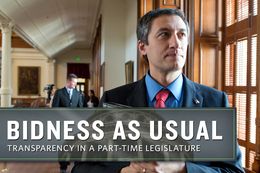
In politics, everybody loves to talk about transparency. But one Texan's transparency is another’s right to privacy, and people generally find it easier to demand openness than to provide it.
It was a call for more transparent elections — to bring shadowy political money into the light of day — that drove the Senate to approve Senate Bill 346 by Sen. Kel Seliger, R-Amarill0, by a 23-6 margin last week.
But then political interest groups on both the left and the right decided they didn’t want to be forced to disclose major donors to their 501(c)(4) committees, or politically active nonprofits. So lawmakers were pressured to change their votes.
And in a highly unusual parliamentary maneuver a day later, the Senate approved, 21-10, a measure to “recall’’ the bill. But by then, the legislation was in the custody of the Texas House, which has scheduled a public hearing on Wednesday. They aren't sending the bill back, so the fight has shifted there.
Opponents are now equating the need for secrecy with the right of free speech, a connection Seliger rejected.
“It addresses only transparency, which almost every member of this body claims to support,” Seliger said in an email. “However, evidence indicates otherwise."
The love-hate relationship with transparency has also been on display in the highly public spat between the University of Texas System and the Legislature.
UT regents have been demanding that UT-Austin be more transparent, by demanding the campus provide voluminous records and, at one point, requiring UT President Bill Powers to keep all of his incoming and outgoing emails.
“We’re under a great deal of pressure right now from the Legislature and others to increase and ensure transparency,” Regent Paul Foster said right before a recent vote seeking more information about a controversial law school program.
Never mind that Gov. Rick Perry, who appointed the regents, has a controversial office policy of deleting emails once a week unless there is some specific requirement they be kept. Or that Regent Wallace Hall, who has helped lead the charge for more openness at UT, angered legislators for failing to disclose several lawsuits as required on his application to become a regent.
After state lawmakers turned the tables on the UT System and demanded some transparency there, Regents Chairman Gene Powell initially said the request for documents was too broad and may “disrupt the power” of the system to fulfill its mission. The full board, facing an uproar at the Capitol, reversed course and voted earlier this month to provide the records.
The lesson here is that it’s hard to be openly hostile to open government. No one needs to school Rep. Giovanni Capriglione, R-Southlake, about that. He was pilloried for pushing lawmakers to reveal their personal business dealings with local government entities. But the attacks on his HB 524 backfired and and some of his critics have since become enthusiastic cheerleaders for it.
Capriglione is now pushing another bill, authored by Rep. Bill Callegari, R-Houston, that would introduce more transparency in public pension systems and that would allow the public to get a clearer look at future liabilities. For now, the bill would still keep secret an individual’s pension benefit, and it exempts state legislators’ lucrative pensions from the heightened scrutiny altogether at this point. Capriglione favors adding an amendment making the legislation apply to lawmakers, too.
In the meantime, he’s gotten an earful from public sector pension advocates who are fighting the release of individual pension information because they say it would undermine their privacy and could even jeopardize their safety.
“They all say they want transparency,” Capriglione said. “And in the same breath that they say they’re for transparency, they’re talking about how to remove it.”










